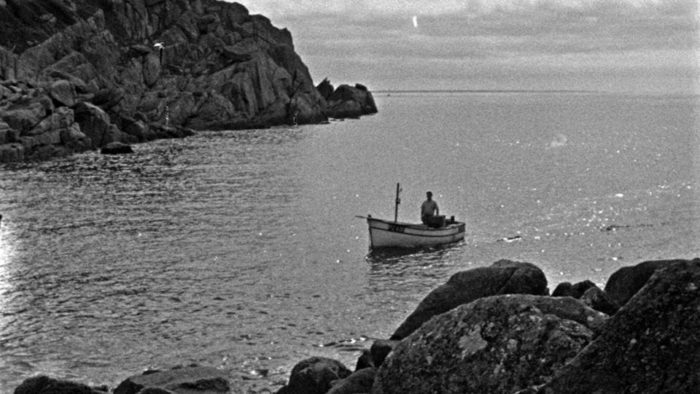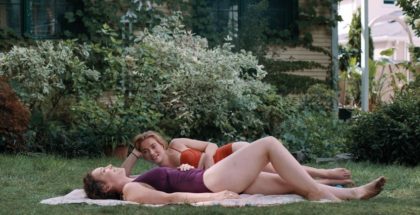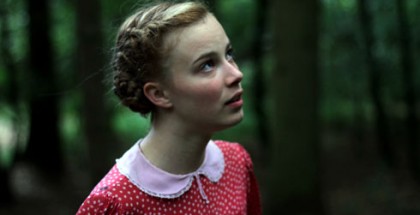BFI Player review: Mark Jenkin Short Films
Review Overview
Direction
9Use of celluloid
9Services to the Cornish Tourist Board
9Laurence Boyce | On 30, Aug 2020
Those who have had the pleasure of seeing the astounding Bait will know that Mark Jenkin is one of the UK’s most striking filmmakers. A recently released collection of his earlier short films on the BFI Player will allow audiences to discover some of his short works, which not only provide an interesting insight into the themes and ideas that would develop into his first feature but also showcase an experimental filmmaker who combines a compelling visual sensibility with playfulness and pathos. Indeed, anyone knowing their British artist filmmakers – from the likes of Derek Jarman and John Smith to more modern artists such as Ben Rivers and Andrew Kötting – will see how Jenkins follows their footsteps while ploughing his own unique furrow.
Utilising hand-developed 16mm, Jenkin’s work engages with his self-penned Silent Landscape Dancing Grain 13 Film Manifesto, a Dogme ‘95-like declaration that helps promote “the aesthetic and practical benefits of handmade celluloid work”. It gives his work an immensely tactile quality (even when screened outside of the theatrical experience) and that physicality brings us closer to the images and characters he presents. Underneath a layer of cinematic artifice, his works are often impassioned and pointed political pieces that engage with many of the pressing issues of modern times.
We take a look at each of the four films below:
Bronco’s House (2015, 44mins)
In some ways a dry run for Bait, Bronco’s House is an experimental drama that examines the titular Bronco as he attempts to provide a house for himself and his pregnant girlfriend in his native Cornwall. But with the greed of others, Bronco finds the modern world an unforgiving place for those needing to put a roof over their head.
This is an ethereal and affecting affair as Jenkin plays with the tropes of the British kitchen sink drama and suffuses it with an air of surrealism. It deals with a number of heady issues, gentrification, masculinity and infidelity among them. The slightly theatrical mode of acting adds to the sense of the strange and also creates an almost distancing effect. (The theatricality is emphasised by the film stock, which results in lots of quick cuts and close-ups and requires post-synced sound.)
This becomes a morality play in which the characters are archetypes (aside from Bronco, all are named in the credits via titles such as The Girlfriend or The Landlord). Yet even with this distancing, everything still feels emotionally engaging. The black-and-white photography here is often haunting, a crumbling landscape made into an inhospitable place where one can’t find a home. But there’s also a dark beauty on offer, a small smattering of hope even in the depths of despair.
Enough To Fill Up An Egg Cup (2016, 36mins)
This melancholic experimental documentary focuses on a small Cornish fishing cove while the spectre of climate change drifts into the background. Jenkin intersperses audio of an interview with fisherman Richard “Taffy” Matthews and snippets of news reports about global warming with often beautiful and bucolic images of the Cornwall coast.
As the imagery and Rick Williams’ soothing score create a gentle and rhythmic cinematic poem, the film creates something of a lament, with melancholic regret for a world gone by. Once again there are ideas of gentrification at play, with Matthews reflecting that if he got money for every tourist wanting to take a photo of him fishing, he’d be a very rich man indeed, while realising the place needs said tourists to survive. Indeed, while the destructive nature of global warming is brought forth with the soundbites of news reports, scientists and politicians all acting as rude interruptions to the film’s hypnotic charms, there’s a sense that it is the modern world in general that is destructive. Whether it be a flood of water or a flood of rich tourists, the erosion will happen anyway.
David Bowie Is Dead (2018, 17mins)
It is the day after David Bowie has died and Mark Jenkin heads into London in a psycho-geographcial road trip in which the disappointment of the present day clashes with the spectres of the past.
With a kaleidoscope of imagery, Jenkin provides a stream-of-consciousness voiceover as he reminisces about his past in the capital and the changes that he has seen over the past two decades. The film is not only a paean to lost youth but also a condemnation of a generation that seems to have lost its way. A picket line to defend to the NHS turns out to be a photoshoot for an NBA team. A trip to an arthouse cinema morphs into a cold, lonely and forgettable screening of the new Star Wars film that speaks to Jenkin of the death of celluloid and cinema.
Yet for all its anger at the passing of time there is still an underlying sense of playfulness here, with Jenkin often dryly funny and the vibrant imagery of the capital giving a breathless sense of energy.
Hard Cracked The Wind (2019, 17mins)
Jenkin channels the spirit of MR James as he tells a unique ghost story of a young Cornish poet who discovers a writing case with her initials on it. Discovering the remnants of a poem with it – beginning with the phrase “Hard cracked the wind” – she begins to feel the presence of its previous owner, as his words ripple throughout time.
This cinematic palimpsest is a wonderfully evocative piece of work, as our protagonist’s disaffection with the present day would seem to lend her a romantic view of the past. But the lure of romanticism cannot compete with past and present melding into one as the pleasures and pains of creating art are shared throughout the centuries.
Once again, Jenkin’s crisp black-and-white photography shines, while his sense of the strange and surreal works excellently within the confines of the story. Perhaps one of his most overtly genre piece of works, it’s a haunting affair.
The Mark Jenkin Short Film Collection is available now on BFI Player, as part of a £4.99 monthly subscription.




















